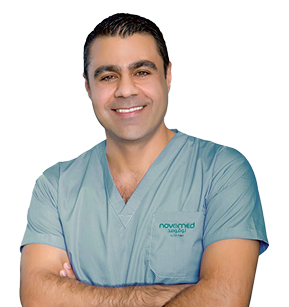What to Expect?
It is recommended to visit your dentist every 6 months to keep a tab on your teeth, gums, and overall oral health. Detecting various dental issues in the early stages will help you maintain a healthy smile. Novomed’s team of dentists will always ensure you feel as relaxed as possible, whilst offering clear and transparent treatment options. Even if you assume your teeth are perfectly healthy and you do not suspect any oral health or dental problems, it is still recommended to visit a dentist for a routine dental checkup.
The Examination
During your dental examination, the dentist will check your teeth, gums, and mouth. Various instruments will be used to allow a thorough examination of your mouth and teeth, as for some dental issues may not be obvious at first glance. If you have dentures or bridges, your dentist will examine how well they fit and discuss the need for potential adjustments.
During your dental check-up, your dentist will:
- Evaluate your overall oral hygiene and health
- Teeth will be cleaned; removing stains and plaque from your teeth
- Evaluate potential risks of gum disease, bone disease, and tooth or root decay
- Assessing your bite and jaw for potential alignment issues
- Determining your need for fluoride
- Oral cancer detection
- May take dental x-rays if necessary, or conduct other diagnostic procedures
- Evaluate your need for tooth replacement or restoration
Additionally, your dentist will ask if you are taking any medications and if you have any existing health problems. Some medications and illness may pose a greater risk to your oral health; therefore, it is important to share these details with your dentist. The dentist may provide advice about the necessary diet adjustments and changes in other lifestyle factors that can affect your oral health, such as the use of tobacco products.
Teeth Cleaning
Your dentist will start by removing any built-up plaque and tartar that may have collected above and below the gum line. They will follow by flossing between and around every tooth to remove additional plaque or food particles which have remained in your teeth. Following, with a slightly abrasive paste, your dentist will use a tooth polisher with a spinning head. Polishing will remove any excess residue and will make your teeth smoother to promote less plaque buildup.
Dental X-Rays
Dental X-rays allow your dentist to see detailed images of specific sections of the mouth to help diagnose problems that may not be visible during the dental examination. Dental X-rays may not be necessary during every dental visit. Depending on your oral health and risk of disease, your dentist will discuss whether X-rays are needed.
Keeping Your Gums and Teeth Healthy
It is important to ensure you are taking care of your teeth and gums between routine dental visits. Plaque buildup is always forming on your teeth, but it can be managed by flossing and brushing your teeth daily. Brushing and flossing every day can prevent several oral health problems such as:
- Gum disease (gingivitis)
- Cavities
- Tooth abscesses
- Oral cancer
- Other oral and dental infections
Follow These Tips to Ensure Optimal Day-To-Day Oral Care:
- Be sure to brush your teeth at least twice, daily
- Use a toothpaste that contains fluoride
- Floss at least once, daily
- Use mouthwash daily, to promote fresh breath, and to fight bacteria and plaque buildup
- Avoid tobacco products
- Limit sugary snacks and drinks
- Follow a diet that includes plenty of fruits and vegetables (high-fiber, low-fat, low-sugar)




























